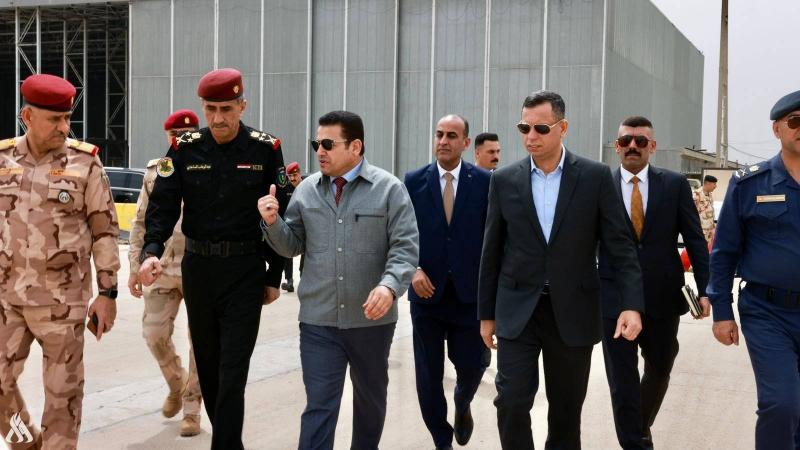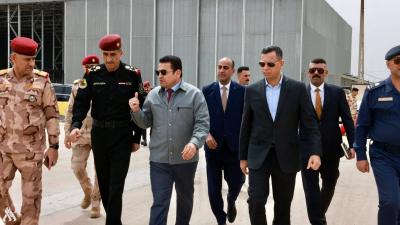National Security Advisor Qassim al-Araji emphasized that Iraq does not want to be a battleground for the conflict between the United States and Iran, stating that the military committee between Washington and Baghdad will determine the fate of the international coalition forces led by the United States.
In an interview with the Quincy Institute published in English and translated by Shafaq News, al-Araji confirmed that Iraq has become capable of addressing the threat posed by ISIS, but it requires bilateral cooperation with other countries. The American report described al-Araji as a longtime official in the Iraqi security establishment who received training from the Iranian Revolutionary Guard and fought against Saddam Hussein's regime before returning to Iraq in 2003. He was among the first prominent figures arrested by the Americans post-invasion, released after three months, then re-arrested in 2007 and held in the Bucca prison until 2009.
The report highlighted al-Araji's membership in the Badr Brigade, his election to parliament in 2014, his appointment as Iraq's Minister of Interior in 2017, and his role as National Security Advisor in 2020. Despite fluctuating relations with Washington before 2017, his tenures as Minister of Interior and National Security Advisor received praise from foreign military and diplomatic officials who recognized his professionalism and willingness to collaborate with them, particularly on security issues relevant to both parties.
The interview, conducted on the sidelines of the Antalya Diplomacy Forum on March 1, addressed major threats facing Iraq, with al-Araji joking about the American and Iranian obsession with influence in Iraq, which he deemed unacceptable to Baghdad.
Responding to a question about significant security challenges confronting Iraq, al-Araji noted that "since the defeat of ISIS, drugs have become our greatest challenge now, and the intervention of other countries poses another threat to our stability." He believes that Iraq should not interfere in the affairs of other countries and expects the same from others.
When asked about regional neighbors’ support on issues like ISIS and drug trafficking, al-Araji stated that "drugs represent a global challenge, thus requiring regional and international cooperation, not just with our neighbors but with the entire world." He acknowledged a certain level of cooperation but believed more efforts were needed as drugs pose a common threat to the stability and prosperity of all countries.
Regarding the seriousness of the ISIS threat and the Iraqi forces' ability to handle it independently, al-Araji indicated that "our battle with ISIS is primarily an intelligence battle," and the available information suggests that ISIS does not have many fighters in Iraq. He stressed the necessity of cooperating with other partners in intelligence sharing to combat and defeat the remaining ISIS fighters, adding that "the main threat consists of 10,000 foreign ISIS members from different countries, in addition to those from Iraq and Syria."
Al-Araji continued by saying that while the remaining ISIS fighters in Iraq do not pose a significant threat, they still represent a danger. He affirmed that "Iraq is capable of facing ISIS alone, but requires cooperation with others to cut off the financial support and other resources provided to ISIS," noting that Baghdad signed around 23 memoranda of understanding with neighbors and other countries last year to address ISIS.
He also highlighted the "significant threat" posed by the al-Hol camp, emphasizing that it continues to supply ISIS extremists and thus urging countries to repatriate their citizens from it.
In response to a question about concerns over the spillover effects of the Gaza war on the region and the likelihood of escalation, al-Araji stated that such an extension from Gaza "will affect Iraq and the entire region, and the war crimes occurring in Gaza will impact the stability of the whole region," asserting that humanity rejects the current situation in Gaza and that the policies of starvation, killing, and displacing people affect the entire world. He questioned why the international community cannot stop this war and remarked on the empathy felt for the Palestinians.
Al-Araji mentioned a U.S. Air Force pilot who burned himself to death over Gaza, indicating the deep emotional and humanitarian implications of the conflict.
When asked about the questions surrounding militia roles in the national security frameworks and why they are not being disbanded or integrated into the Ministry of Defense and Ministry of Interior, he replied that "these factions do not work against the government but support the current government, and some played a role in defeating ISIS in Iraq."
He acknowledged that "there is no legal framework for their existence in Iraq, and our security institutions are very clear. The current government is making every effort to control weapons that are beyond its control." However, he explained that "these factions first formed during the U.S. occupation of Iraq, and any country that feels occupied by another will lead to the emergence of such resistance factions. After the withdrawal of U.S. forces from Iraq in 2011, the country stabilized with few major security problems."
He noted that "when ISIS invaded and occupied more than a third of our territory, these factions formed again to defeat ISIS, and what is happening now in Gaza serves as an excuse for these factions to resume their activities, which is embarrassing for the government as it tries its best to prevent escalations."
Al-Araji remarked that "we are in contact with them, and I speak personally with these factions. If some of them are willing to join the Iraqi security forces, we can work on that together," further asserting that "Iraq's stability relies on keeping all weapons under the control of the state and the government."
In response to a question about U.S. criticism regarding lack of action on attacks against its forces and difficulties in arresting and prosecuting those responsible, al-Araji stated that "there are very clear orders and instructions from the government to arrest and prosecute anyone involved in attacking Americans." He indicated that those who attacked the U.S. embassy have been arrested, and also some who attacked U.S. advisors at Iraqi bases are being apprehended.
When asked if it is time for U.S.-led coalition forces to leave Iraq or if there is compelling reason for their presence, al-Araji asserted that "Iraqi forces can face ISIS and other security challenges, and the international coalition recognizes this," adding that "relations between Iraq and the international coalition are positive, and we look forward to keeping these ties friendly. We are friends and partners. They are here because we requested them to be here, and after ten years, it is right for Iraq to reassess the terms of this presence. There is a high-level Iraqi-American coordinating committee that will evaluate the presence of Americans and the coalition in Iraq."
Al-Araji concluded by saying, "We are waiting for the results of these committees, and based on the reports, we will take necessary actions," indicating that "Iraq wants to establish separate bilateral relations with members of the international coalition and already has a bilateral agreement with the Americans. We look forward to enhancing bilateral relations with countries." He expressed, "We truly want to have bilateral cooperation with the United States and all other coalition members."
When asked if Americans appear obsessed with Iranian influence in Iraq and whether this is justified, al-Araji laughed and replied, "And Iran is also obsessed with American influence in Iraq." He added that "the Iraqi government's perspective is that we do not support Iranian or American influence in the Iraqi decision-making process. We maintain good relations with both Iran and the United States, but the conflict between them adversely affects Iraq, and we hope that Iraq will not be a battleground for proxies." He concluded, "I believe that restoring relations between the United States and Iran will also help the relationship between Iraq and the United States and will positively affect Iraq overall."




